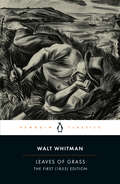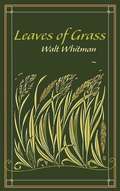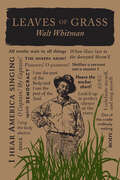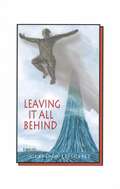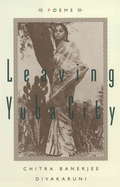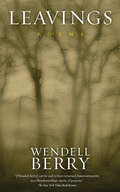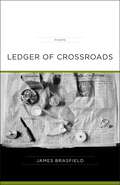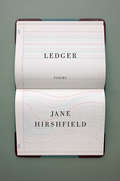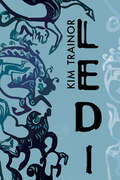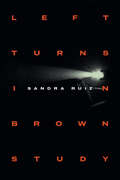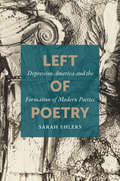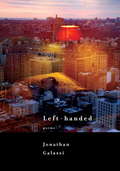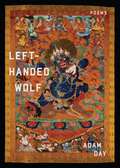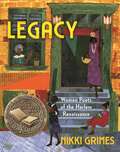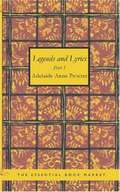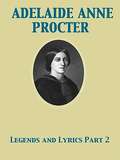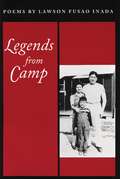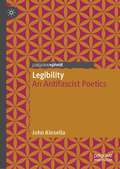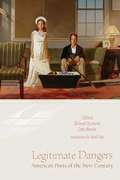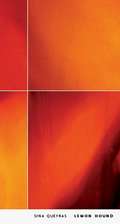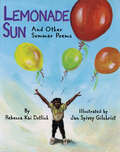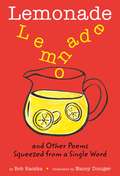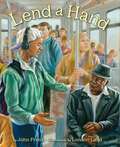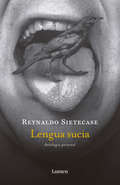- Table View
- List View
Leaves of Grass: The First (1855) Edition
by Walt WhitmanThis is the original and complete 1855 edition of one of the greatest masterpieces of American literature, including Whitman's own introduction to the work. .
Leaves of Grass: The Original 1855 Edition (Leather-bound Classics #Vol. No. 9)
by Walt Whitman Kenneth C. MondscheinA timeless collection of hundreds of poems that resonate to the American spirit. Leaves of Grass is a timeless collection of poems and essays penned by influential nineteenth-century writer Walt Whitman. This profound compilation explores topics such as nature, mysticism, mortality, transcendentalism, and democracy. Inspired by personal experiences and observations, Whitman spent almost four decades piecing together the complete work, sharing societal ideals and epiphanies about life that still resonate with readers today. This edition of the complete Leaves of Grass also includes Whitman’s preface to the original 1855 edition, in which he expounds on his personal philosophy of writing poetry, and an introduction by scholar Kenneth C. Mondschein.
Leaves of Grass: The Poems Of Walt Whitman (Word Cloud Classics)
by Walt WhitmanA seminal event in American literature, this nineteenth-century collection of poetry and essays celebrates nature and humanity&’s place in it.Leaves of Grass is a timeless collection of poems and essays penned by influential nineteenth-century writer Walt Whitman. This profound compilation explores topics such as nature, mysticism, mortality, transcendentalism, and democracy. Inspired by personal experiences and observations, Whitman spent almost four decades piecing together the complete work, sharing societal ideals and epiphanies about life that still resonate with readers today.
Leaving Yuba City
by Chitra Banerjee DivakaruniLike Divakaruni's much-loved and bestselling short story collection Arranged Marriage, this collection of poetry deals with India and the Indian experience in America, from the adventures of going to a convent school in India run by Irish nuns (Growing up in Darjeeling) to the history of the earliest Indian immigrants in the U.S. (Yuba City Poems).Groups of interlinked poems divided into six sections are peopled by many of the same characters and explore varying themes. Here, Divakaruni is particularly interested in how different art forms can influence and inspire each other. One section, entitled Indian Miniatures, is based on and named after a series of paintings by Francesco Clemente. Another, called Moving Pictures, is based on Indian films, including Mira Nair's "Salaam Bombay" and Satyajit Ray's "Ghare Baire." Photographs by Raghubir Singh inspired the section entitled Rajasthani. The trials and tribulations of growing up and immigration are also considered here and, as with all of Divakaruni's writing, these poems deal with the experience of women and their struggle to find identities for themselves.This collection is touched with the same magic and universal appeal that excited readers of Arranged Marriage. In Leaving Yuba City, Chitra Banerjee Divakaruni proves once again her remarkable literary talents.From the Trade Paperback edition.
Leavings: Poems
by Wendell Berry“Berry has become ever more prophetic . . . In the Sabbaths of 2005–08 published here, Berry angrily mourns the degradation of the nation wrought by destruction of the land and the pursuit of wealth and power. He says that we must prepare to live without hope for a while, though in the very first of the Sabbaths, he prays not to lose love along with hope: ‘Help me, please, to carry / this candle against the wind.’ Despite anger and bitterness, he often recalls and teaches the beauty and propriety of creation, too. If he is a Jeremiah, he is also a David the psalmist.” —BooklistNo one writes like Wendell Berry. Whether essay, novel, story, or poem, his inimitable voice rings true, as natural as the land he has farmed in Kentucky for over 40 years.Following the widely praised Given, this new collection offers a masterful blend of epigrams, elegies, lyrics, and letters, with the occasional short love poem. Alternately amused, outraged, and resigned, Berry's welcome voice is the constant in this varied mix. The book concludes with a new sequence of Sabbath poems, works that have spawned from Berry's Sunday morning walks of meditation and observation.Berry's themes are reflections of his life: friends, family, the farm, the nature around us as well as within. He speaks strongly for himself and sometimes for the lost heart of the country. As he has borne witness to the world for eight decades, what he offers us now in this collection of poems is of incomparable value.
Ledger of Crossroads: Poems
by James BrasfieldIn James Brasfield’s Ledger of Crossroads, layered by light and shadow, the crossroads emerge from distinct yet inseparable geographies. Grounded in the sensual world, the poems fuse American and Eastern European landscapes: “the char of silence and beauty, / brick foundations of what was here, dirt roads / cut through pines, rivers and the dust of the dead.” Here are experiences from the American South, of those who believed Jim Crow “the way things . . . had to be,” and from the fallen imperiums of those “who have always / returned to fewer trees and a wall,” whose intimate perceptions provide moments of reprieves: “beyond the faint scent / of almond in the air and heavy clouds / funneling from the earth into snowfall, / the current calmed within that distant / bend of the Vistula.” Here we become the identities of others, their time and place, from the strata of their histories. They enter our lives.
Ledger: Poems
by Jane HirshfieldA pivotal book of personal, ecological, and political reckoning from the internationally renowned poet named "among the modern masters" (The Washington Post).Ledger's pages hold the most important and masterly work yet by Jane Hirshfield, one of our most celebrated contemporary poets. From the already much-quoted opening lines of despair and defiance ("Let them not say: we did not see it. / We saw"), Hirshfield's poems inscribe a registry, both personal and communal, of our present-day predicaments. They call us to deepened dimensions of thought, feeling, and action. They summon our responsibility to sustain one another and the earth while pondering, acutely and tenderly, the crises of refugees, justice, and climate. They consider "the minimum mass for a whale, for a language, an ice cap," recognize the intimacies of connection, and meditate upon doubt and contentment, a library book with previously dog-eared corners, the hunger for surprise, and the debt we owe this world's continuing beauty. Hirshfield's signature alloy of fact and imagination, clarity and mystery, inquiry, observation, and embodied emotion has created a book of indispensable poems, tuned toward issues of consequence to all who share this world's current and future fate.
Ledi
by Kim TrainorLedi, the second book by Vancouver poet Kim Trainor, describes the excavation of an Iron Age Pazyryk woman from her ice-bound grave in the steppes of Siberia. Along with the woman's carefully preserved body, with its blue tattoos of leopards and griffins, grave goods were also discovered—rosehips and wild garlic, translucent vessels carved from horn, snow-white felt stockings and coriander seeds for burning at death. The archaeologist who discovered her, Natalya Polosmak, called her 'Ledi'—'the Lady'—and it was speculated that she may have held a ceremonial position such as story teller or shaman within her tribe.Trainor uses this burial site to undertake the emotional excavation of the death of a former lover by suicide. This book-length poem presents a compelling story in the form of an archaeologist's notebook, a collage of journal entries, spare lyric poems, inventories, and images. As the poem relates the discovery of Ledi's gravesite, the narrator attempts simultaneously to reconstruct her own past relationship and the body of her lover.
Left Turns in Brown Study (Writing Matters!)
by Sandra RuizIn Left Turns in Brown Study Sandra Ruiz offers a poetic-theoretical inquiry into the interlacing forms of study and mourning. Drawing on Black and Brown activism and theory, Ruiz interweaves poetry, memoir, lyrical essay, and vignettes to examine study as an emancipatory practice. Proposing “brown study” as key for understanding how Brownness harbors loss and suffering along with the possibility for more abundant ways of living, Ruiz invites readers to turn left into the sounds, phrases, and principles of anticolonial ways of reading, writing, citing, and listening. In doing so, Ruiz engages with a panoply of hauntings, ghosts, and spectral presences, from deceased teachers, illiterate ancestors, and those lost to unnatural disasters to all those victims of institutional and colonial violence. Study is shared movement and Brownness lives in citation. Conceptual, poetic, and unconventional, this book is crucial for all those who theorize minoritarian literary aesthetics and think through utopia, queer possibility, and the entwinement of forms.
Left of Poetry: Depression America and the Formation of Modern Poetics
by Sarah EhlersIn this incisive study, Sarah Ehlers returns to the Depression-era United States in order to unsettle longstanding ideas about poetry and emerging approaches to poetics. By bringing to light a range of archival materials and theories about poetry that emerged on the 1930s left, Ehlers reimagines the historical formation of modern poetics. Offering new and challenging readings of prominent figures such as Langston Hughes, Muriel Rukeyser, and Jacques Roumain, and uncovering the contributions of lesser-known writers such as Genevieve Taggard and Martha Millet, Ehlers illuminates an aesthetically and geographically diverse matrix of schools and movements. Resisting the dismissal of thirties left writing as mere propaganda, the book reveals how communist-affiliated poets experimented with poetic modes—such as lyric and documentary—and genres, including songs, ballads, and nursery rhymes, in ways that challenged existing frameworks for understanding the relationships among poetic form, political commitment, and historical transformation. As Ehlers shows, Depression left movements and their international connections are crucial for understanding both the history of modern poetry and the role of poetic thought in conceptualizing historical change.
Left-Handed
by Jonathan GalassiAn emotionally riveting collection that tells a powerful story of passion, loss, and transformation. Left-handed unfolds in the manner of an intense, searching novella. At its center is a one-way dialogue with an elusive character who beguiles and torments but also inspires the unnamed narrator, who at midlife is telling the tale. These poems--decisive, wrenching, exquisite--show an overpowering force, at once disruptive and creative, invading a settled existence. They take us from the streets of New York City to a house in the country, from the island of Naxos to the Roman Forum. They reach back to the sonnets of Shakespeare but find inspiration, too, in contemporary life. Naked and raw, lyrical yet formally inventive, rich with the melancholy wisdom of age, this is a work of resonant and shimmering beauty.
Left-Handed Wolf: Poems
by Adam DayAdam Day’s Left-Handed Wolf offers short lyrical meditations and narratives that wrestle with contemporary issues of the environment, spirituality, and the social. These compact, imagistic poems welcome space and silence as a way of addressing both the commonality and complexity of people and experience. Day’s poems—influenced by meditation practice, as well as by classical Japanese and Chinese verse—are serious and bawdy, reverential and impertinent, accessible and eclectic, yet unified in their tone, atmosphere, and sensibility.
Legacy: Women Poets of the Harlem Renaissance
by Nikki GrimesFrom Children's Literature Legacy Award-winning author Nikki Grimes comes a feminist-forward new collection of poetry celebrating the little-known women poets of the Harlem Renaissance--paired with full-color, original art from today's most talented female African-American illustrators.
Legends and Lyrics. Part 1
by Adelaide Anne ProcterCollection of legends and lyric poems. Contributor: Charles Dickens.
Legends and Lyrics. Part 2
by Adelaide Anne ProcterCollection of legends and lyric poems. Contributor: Charles Dickens. This popular classic work by Adelaide Anne Procter is in the English language, and may not include graphics or images from the original edition. If you enjoy the works of Adelaide Anne Procter then we highly recommend this publication for your book collection.
Legends from Camp
by Lawson Fusao InadaInada talks about life in Japanese internment camps, jazz, and living in Fresno, CA. Inada's poems are playful, engaging and directed towards a wide audience.
Legibility: An Antifascist Poetics (Modern and Contemporary Poetry and Poetics)
by John KinsellaThis Pivot book provides a wide-ranging and diverse commentary on issues of legibility (and illegibility) around poetry, antifascist pacifist activism, environmentalism and the language of protest. A timely meditation from poet John Kinsella, the book focuses on participation in protest, demonstration and intervention on behalf of human rights activism, and writing and acting peacefully but persistently against tyranny. The book also examines how we make records and what we do with them, how we might use poetry to act or enact and/or to discuss such necessities and events. A book about community, human and animal rights and the way poetry can be used as a peaceful and decisive means of intervention in moment of public social and environmental crisis. Ultimately, it is a poetics against fascism with a focus on the well-being of the biosphere and all it contains.
Legitimate Dangers: American Poets of the New Century
by Cate Marvin Michael DumanisThis groundbreaking anthology offers a broad and representative introduction to some of the most exciting, fresh voices on the contemporary poetry landscape by gathering together generous selections from the work of 85 younger American poets.The poets selected were born after 1960, published their first book within the last 10 years, and have no more than three books published. Some are the recipients of numerous awards, while others, who are making their first appearance, are quickly making significant contributions to twenty-first-century poetry.The poets include Rick Barot, Joshua Beckman, David Berman, Nick Flynn, Matthea Harvey, Terrance Hayes, Major Jackson, James Kimbrell, D.A. Powell, Spencer Reece, Matthew Rohrer, Rebecca Wolff, Kevin Young, Matthew Zapruder, Andrew Zawacki, and many others.
Lekin Phir Bhi (Kavya - Sangrah): लेकिन फिर भी
by Rajesh Asudani ‘Raqeeb’"लेकिन फिर भी" राजेश आसूदाणी 'रक़ीब' का काव्य-संग्रह है, जो गहन भावनात्मक और दार्शनिक विषयों पर आधारित है। इस संग्रह की कविताएँ मानवीय अनुभवों की जटिलताओं को व्यक्त करती हैं, जिसमें व्यक्तिगत भावनाओं से लेकर ब्रह्मांडीय चिंतन तक की झलक मिलती है। आसूदाणी की रचनाएँ प्रेम, वियोग, अस्तित्व की पीड़ा और सामाजिक मुद्दों को छूती हैं, और पारंपरिक ग़ज़ल शैली को आधुनिक संदर्भों में प्रस्तुत करती हैं। संग्रह का प्रमुख विषय जीवन में अंतर्विरोधों की उपस्थिति को दर्शाता है, जैसा कि पंक्तियों में व्यक्त किया गया है, "ख़ूब नमी है लेकिन फिर भी आग लगी है लेकिन फिर भी"। यह काव्य यात्रा मानवीय भावनाओं और विचारों की गहराई में उतरकर, जीवन के अनिश्चित पहलुओं में व्याप्त पीड़ा, आशा और धैर्य को उकेरती है।
Lemon Hound
by Sina QueyrasAs meditative practices focus on the axis of breath, these poems focus on the moment of action, of thought, on the flux of speech.This is a poetry not of snapshots or collages but of long-exposed captures of the not-so-still lives of women. One sequence imagines Virginia Woolf's childhood; another unmakes her novel The Waves by attempting to untangle its six overlapping narratives. Yet another, 'On the Scent,' makes us flâneurs through the lives of a series of contemporary women, while 'The River Is All Thumbs' uses a palette of vibrant repetition to 'paint' a landscape.Queyras's language - astute, insistent, languorous - repeats and echoes until it becomes hypnotic, chimerical, almost halluncinatory in its reflexivity. How lyrical can prose poetry be? How closely can it mimic painting? Sculpture? Film? How do we make a moment firm? These 'postmodern,' 'postfeminist' poems pulse between prose and poetry: the line, the line, they seem to ask, must it ever end?
Lemonade Sun: And Other Summer Poems
by Rebecca Kai DotlichLike the spicy sweetness of an ice-cold glass of lemonade, these bright and happy poems promise--and deliver--a shiver of recognition and refreshment. From the classic subjects of "My Lemonade Stand" and "Jacks" to the jazzy rhythms of "Jump Rope Talk" to the lyrical beauty of "Backyard Bubbles," this stunning collection from Rebecca Kai Dotlich is drenched in summer colors and pleasures. Color illustrations by award-winning artist Jan Spivey Gilchrist add an edgy charm.
Lemonade: And Other Poems Squeezed from a Single Word
by Bob Raczka Nancy Doniger<p>Play with your words! A brand-new poetic form that turns word puzzles into poetry. <p>Part anagram, part rebus, part riddle—the poems in Lemonade: and Other Poems Squeezed from a Single Word capture a scene from a child's daily life and present a puzzle to solve. Sometimes sweet and sometimes funny but always clever, these poems are fun to read and even more fun for kids to write. Bob Raczka is a fresh, new voice in children's poetry who knows that fun and games can turn a poetry lesson into lemonade!</p>
Lend a Hand: Poems About Giving
by John FrankA collection of original poems centered on giving and spontaneous acts of kindness, which also incorporate larger themes of community, intergenerational relationships, young mentors, and care for the environment."The spread of warmthshould have no bounds." Making a difference in the world can be as simple as planting a tree, giving up your seat on a bus to a disabled person, or training a puppy to become a guide dog. These are just a few of the simple acts of kindness featured in this collection of fourteen original poems. Each poem emphasizes the compassion and the joy of giving. Representing diverse voices-different ages and backgrounds-the collection shows the bridging of boundaries between people who are often perceived as being different from one another. The first step in bridging those boundaries is to extend a hand. John Frank is an accomplished poet and the author of several children's books, including three highly-praised poetry collections. Coupled with London Ladd's emotive illustrations, Lend a Hand demonstrates that empathy and social awareness can start at an early age.
Lengua sucia: Antología personal
by Reynaldo SietecaseLengua sucia es la antología poética personal de Reynaldo Sietecase, donde el autor reúne una selección de todos sus poemas e incluye el poemario inédito homónimo. El poder disruptivo de sus versos juega con la lengua, la embarra y se detiene en esos detalles que solo un poeta puede observar. Los primeros pasos literarios de Reynaldo Sietecase fueron como poeta. En Lengua sucia reunimos su antología poética y nos llevamos de regalo un poemario inédito para seguir descubriendo en cada verso los universos que el autor habita. Lengua sucia desafía al lector desde la materialidad del lenguaje y desde su propuesta. En estos poemas el autor deposita sus ojos en lo marginal, para renovar nuestra mirada sobre estas sombras, dando luz con su palabra. Ilumina con pinceladas eróticas un lenguaje sobre el cuerpo, que le permite retornar a lo más esencial del ser humano. No dejamos de encontrarnos con el periodista, con el cronista, ni con el novelista, todos asisten a esta comunión literaria. Al enredar la lengua, Reynaldo nos demuestra que ensuciarse también es jugar. La crítica ha dicho... «Poetas como Reynaldo Sietecase escriben en voz alta, y los leemos como quien escucha declamar a un príncipe.»Andrés Calamaro «Una respiración jadeada de versos breves hace serpentear la poesía lúdica y lúbrica de Reynaldo Sietecase, que por medio del sarcasmo y a ratos del humor le da cuerda a la minucia de lo cotidiano.»Jorge Boccanera «Largamente esperado, el sexo regresa por fin a la poesía […] Yo saludo estos poemas porque me dan placer, inefable. Y le recuerdo a Reynaldo Sietecase: Orgasmo / Breve vida feliz / Breve muerte feliz.»Mario Trejo «La poesía de Reynaldo Sietecase está construida en base a una ética y una erótica. Hay pocos poetas (Gelman, Trejo, entre ellos) que intenten conciliar en un mismo verso la pasión amorosa y la realidad que los rodea.»Sergio Olguín «Tres décadas de poesía sin que el sólido narrador ni el reconocido periodista lo distraigan de su oficio de poeta. Sietecase escribe para las "pequeñas multitudes". Para los aristócratas de la sensibilidad.»Mariano Schuster
